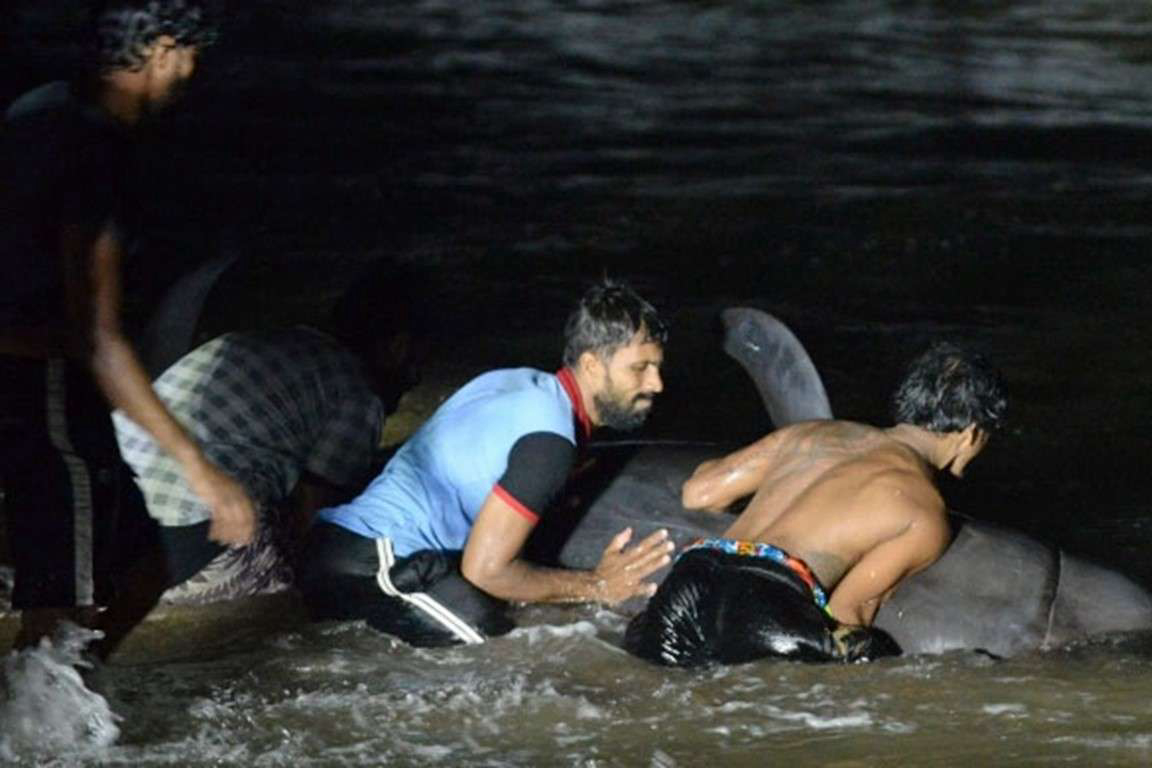
Whales are one of the largest creatures on Earth, and their size and beauty can amaze any human being. But recently, some pilot whales were stranded on a beach in Sri Lanka. Pilot whales are mostly dark grey, brown or black and they are either long-finned or short-finned. The school of around 120 short-finned pilot whales collapsed on shores at Panadura, 25 kilometers south of Colombo - the capital of Sri Lanka.
An overnight rescue operation was conducted by the Sri Lankan navy and coast guard on the beach, along with a group of locals. They managed to rescue 120 pilot whales stranded in Srilanka's biggest mass beaching on 3 November 2020. The locals were initially shocked when they saw numerous whales at once. Then the locals tried to take the matter into their hands and they pushed as many as they could. Further, Marine Environment Protection Authority (MEPA) was involved in the rescue operation of these pilot whales. It was difficult for all the volunteers to push and help the creatures weighing from 1000-3000 kg with crashing waves in the night time. But all the helpers including the locals, coast guards, and the navy rescued the whales except two. Dharshil Lahandapura, chief of Sri Lanka's MEPA compared this phenomena with the mass whales stranding in Tasmania in September 2020. The Tasmanian stranding of whales was one of the world's largest beaching incidents, and it involved 470 pilot whales, of which the team of rescuers could save only around 110.

A navy spokesperson of Sri Lanka, Indika De Silva explained that the volunteers used small inshore patrol crafts to pull the whales one by one back into the deeper ocean. But sadly, two whales died because of some major injuries due to the event of beaching. Beaching is nothing but an event of whales and dolphins stranding themselves on beaches, and ultimately killing themselves due to dehydration, drowning when tides covered their blowhole, crumbling under their weight. Numerous scientists have been studying the phenomenon of mass beaching for so many decades, but they are still unable to completely understand the cause behind this phenomenon. But scientists have been able to develop multiple theories for mass beaching. Some have assumed that mass beaching could be an outcome of a school of whales following their prey towards the beach while hunting. Pilot whales move in groups, and accordingly, some scientists believe that an individual whale could confusingly lead the group to the shores, particularly if it's sonar fails to detect the lines in the shallow parts of an ocean.
There are several incidents of pilot whales beaching on shores in the different parts of the world, as they can be seen in the waters of the entire world. The exact numbers of pilot whales are not fixed, and they are not considered an endangered animal. Pilot whales belong to the Genus Globicephala. They are also called pothead and black-fish, and they are slender toothed whales of the dolphin family Delphinidae. Pilot whales are among the largest of the oceanic dolphins, exceeded in size only by the killer whale. The long-finned pilot whales live in colder waters and short-finned pilot whales live in tropical and subtropical waters.
There are around 1 million long-finned pilot whales and approximately 2,00,000 short-finned pilot whales worldwide. However, when these beautiful creatures collapsed on the shore of Colombo, the navy, coast guards, and locals almost saved them all. Sri Lankan Marine Biologist, Dr. Asha De Vos praised the locals by saying, “These people cared less about their safety in the crashing surf than the safety of these animals in a very difficult time in our planet's history.” In a world where animal cruelty and climate change are real things, a few encouraging and incredible events like this can ascertain that there's still something that we can accomplish to conserve the beauty of our planet.
___________________________________________________________________
Reference:
- www.srilankamirror.com
- www.timesofindia.com
- www.wikipedia.org
